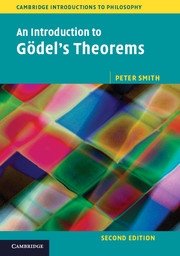Book contents
- Frontmatter
- Contents
- Preface
- Thanks
- 1 What Gödel's Theorems say
- 2 Functions and enumerations
- 3 Effective computability
- 4 Effectively axiomatized theories
- 5 Capturing numerical properties
- 6 The truths of arithmetic
- 7 Sufficiently strong arithmetics
- 8 Interlude: Taking stock
- 9 Induction
- 10 Two formalized arithmetics
- 11 What Q can prove
- 12 IΔ0, an arithmetic with induction
- 13 First-order Peano Arithmetic
- 14 Primitive recursive functions
- 15 LA can express every p.r. function
- 16 Capturing functions
- 17 Q is p.r. adequate
- 18 Interlude: A very little about Principia
- 19 The arithmetization of syntax
- 20 Arithmetization in more detail
- 21 PA is incomplete
- 22 Gödel's First Theorem
- 23 Interlude: About the First Theorem
- 24 The Diagonalization Lemma
- 25 Rosser's proof
- 26 Broadening the scope
- 27 Tarski's Theorem
- 28 Speed-up
- 29 Second-order arithmetics
- 30 Interlude: Incompleteness and Isaacson's Thesis
- 31 Gödel's Second Theorem for PA
- 32 On the ‘unprovability of consistency’
- 33 Generalizing the Second Theorem
- 34 Löb's Theorem and other matters
- 35 Deriving the derivability conditions
- 36 ‘The best and most general version’
- 37 Interlude: The Second Theorem, Hilbert, minds and machines
- 38 μ-Recursive functions
- 39 Q is recursively adequate
- 40 Undecidability and incompleteness
- 41 Turing machines
- 42 Turing machines and recursiveness
- 43 Halting and incompleteness
- 44 The Church–Turing Thesis
- 45 Proving the Thesis?
- 46 Looking back
- Further reading
- Bibliography
- Index
29 - Second-order arithmetics
- Frontmatter
- Contents
- Preface
- Thanks
- 1 What Gödel's Theorems say
- 2 Functions and enumerations
- 3 Effective computability
- 4 Effectively axiomatized theories
- 5 Capturing numerical properties
- 6 The truths of arithmetic
- 7 Sufficiently strong arithmetics
- 8 Interlude: Taking stock
- 9 Induction
- 10 Two formalized arithmetics
- 11 What Q can prove
- 12 IΔ0, an arithmetic with induction
- 13 First-order Peano Arithmetic
- 14 Primitive recursive functions
- 15 LA can express every p.r. function
- 16 Capturing functions
- 17 Q is p.r. adequate
- 18 Interlude: A very little about Principia
- 19 The arithmetization of syntax
- 20 Arithmetization in more detail
- 21 PA is incomplete
- 22 Gödel's First Theorem
- 23 Interlude: About the First Theorem
- 24 The Diagonalization Lemma
- 25 Rosser's proof
- 26 Broadening the scope
- 27 Tarski's Theorem
- 28 Speed-up
- 29 Second-order arithmetics
- 30 Interlude: Incompleteness and Isaacson's Thesis
- 31 Gödel's Second Theorem for PA
- 32 On the ‘unprovability of consistency’
- 33 Generalizing the Second Theorem
- 34 Löb's Theorem and other matters
- 35 Deriving the derivability conditions
- 36 ‘The best and most general version’
- 37 Interlude: The Second Theorem, Hilbert, minds and machines
- 38 μ-Recursive functions
- 39 Q is recursively adequate
- 40 Undecidability and incompleteness
- 41 Turing machines
- 42 Turing machines and recursiveness
- 43 Halting and incompleteness
- 44 The Church–Turing Thesis
- 45 Proving the Thesis?
- 46 Looking back
- Further reading
- Bibliography
- Index
Summary
As we noted at the end of Chapter 9, it is rather natural to suggest that the intuitive principle of arithmetical induction should be regimented as a secondorder principle that quantifies over numerical properties, and which therefore can't be directly expressed in a first-order theory that only quantifies over numbers. So why not work with a second-order theory, rather than hobble our formal arithmetic by forcing it into a first-order straightjacket?
True, we have discovered that – so long as it stays consistent and effectively axiomatized – any theory containing enough arithmetic will be incomplete. But still, we ought to say at least a little about second-order arithmetics, and this is as good a place as any. Indeed, if you have done a university mathematics course, you might very well be feeling rather puzzled by now. Typically, at some point, you are introduced to axioms for a version of ‘Second-order Peano Arithmetic’ and are given the elementary textbook proof that these axioms are categorical, i.e. pin down a unique type of structure. But if this second-order arithmetic does pin down the structure of the natural numbers, then – given that any arithmetic sentence makes a determinate claim about this structure – it apparently follows that this theory does enough to settle the truth-value of every arithmetic sentence. Which makes it sound as if there can after all be a (consistent) negation-complete axiomatic theory of arithmetic richer than first-order PA, flatly contradicting the Gödel-Rosser Theorem.
- Type
- Chapter
- Information
- An Introduction to Gödel's Theorems , pp. 204 - 218Publisher: Cambridge University PressPrint publication year: 2013



